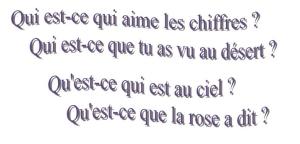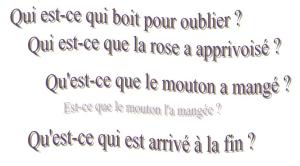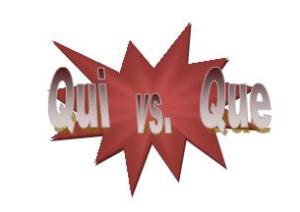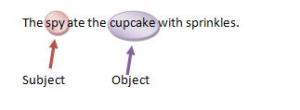New content and resources coming soon!
Male or Female?
Think you know when a word in French is masculine and when it’s feminine?
Here’s a fun little quiz to see just how good you are!
So? How’d you do? Did you get all 20?
Coucou !
This site is in the process of transition. Unfortunately, I have lots on my to do list, so the transition is slow. Soyez patient !
French Grammar and Absurdity
As I said in the "Read Me" page, I try to post links to native French-language sites. I think that this is one of the best ways to practice French, but occasionally there is an English site that's just too good to pass up.
Tex's French Grammar is an American site with Grammar explanations and exercises and I love this site. It's free and it's full of useful information.
Here you'll find many great grammar explanations (written in English and using proper grammar terminology). (If proper grammar terminology intimidates you, don't let it turn you away from this great resource. Read past the first paragraph or two of any grammar point and you'll see loads of useful examples and less frightening information.) You'll find exercises that you can do online (complete with answers). You'll find downloadable PDF's and you'll even find downloadable MP3's. I confess, I haven't used the MP3's much, so I can't comment on their quality, but if they're like the rest of the site, they should be pretty good.
Two caveats:
-I have found one or two mistakes on this site – there aren't many, but they're there. Think you've found one? Post it in a comment!
-This is a university site and it is aimed at university students. While it is never explicit, some of the themes are more adult than what you will find in most high school texts. High school or middle school teachers and tutors may want to review any specific grammar sheet before handing it out to students.
One of the fun things about this website? All of the grammar rules and exercises tell the complicated story of some very odd characters:
Qui or Que – The Saga Continues
Okay, so this grammar point maybe isn't convoluted enough to deserve to be labeled a "saga." Last week, in this post about super-spies and couch potatoes, we talked about the fact that "qui" refers to the subject of a sentence while "que" refers to the object – regardless of whether these were people or things.
Today we're going to review the exception to this rule. You knew it was coming, right? There's always an exception. Where's the fun if there isn't? If the super-spy always gets the documents and the girl without a hitch, the film is pretty dull.
For the grammophiles among you – the difference comes down to parts of speech. In last week's post, "qui" and "que" were relative pronouns « des pronoms relatifs », but this week we are talking about "qui" and "que" as interrogative pronouns « des pronoms interrogatifs ». For example:

Here you can see that the second "qui" or "que" is following the rules for the super-spy and the couch potato. However, the "qui" or "que" that introduces the question now refers to a person or a thing.
Who loves numbers? (Who is it that loves numbers?)
Who did you see in the desert? (Who is it that you saw in the desert?)
What is in the sky? (What is it that is in the sky?)
What did the rose say? (What is is that the rose said?)
Of course, in the last two questions the "que" at the beginning of the sentence become "qu" with an apostrophe joining it to "est-ce" because "est-ce" starts with a vowel.
And a few more examples:

Fairly straightforward, but remember – the point her is that "qui" and "que" are asking questions. A sentence doesn't have to have the question phrase "est-ce que" to be a question. For example:
Que fait le buveur ?
Qui êtes-vous ?
Of course, a great way to practice these pronouns is simply to read them and use them. If you don't immediately recognize the references in this post then you are missing out and your Francophone education has been sorely lacking. You can practice your pronouns and fix this glaring hole in your education by checking out the following book:
http://rcm.amazon.com/e/cm?lt1=_blank&bc1=FFFFFF&IS2=1&bg1=FFFFFF&fc1=000000&lc1=DF9E1E&t=aegtra-20&o=1&p=8&l=as4&m=amazon&f=ifr&asins=2070612759 http://rcm.amazon.com/e/cm?lt1=_blank&bc1=FFFFFF&IS2=1&bg1=FFFFFF&fc1=000000&lc1=D79224&t=aegtra-20&o=1&p=8&l=as4&m=amazon&f=ifr&asins=0156012197
(Same book, different cover/size. I've always had a fondness for the blue cover.) I love this book. It's great for children and adults alike. Check it out!
Qui or Que?
 This question comes up a lot with students. Just what on earth is the difference between "qui" and "que"?
This question comes up a lot with students. Just what on earth is the difference between "qui" and "que"?
It's really very simple –
"Qui" is CEO of a multi-billion dollar, international corporation; president of a country that is a major player on the world stage; and also a super-spy (think 007 meets Chuck Norris meets Ninja meets James Bond- wait… well… you get my point).
"Que" is that annoying cousin that sits on your couch all day and eats your chips – but never vacuums up the crums and doesn't leave until you leverage him out the door with a shovel.
Obviously, by this I mean that "qui" refers to the subject of the sentence – "qui" is the active one."Que" refers to the object of the sentence – "que" is the lump on the log.
A quick review for those of us who have forgotten:

(Okay, technically, "cupcake with sprinkles" is the object.)
The subject does the action to the object. Now, if we'd had a different object in this sentence – say a cookie – that would mean that the spy had failed to get the super-top-secret documents. Fortunately, he ate the cupcake. *Whew.*
Remember, "subject" and "object" are grammatical terms. So, your object can be a person.
"The spy paid the baker."
Similarly, your subject can be a thing:
"The cupcake choked the spy."
How does all of this help with "qui" and "que"? Let's take a look at two more sentences:
"The spy who ate the cupcake." (or) "The spy that ate the cupcake."
vs.
"The cupcake that I gave to the spy."
"L'espion qui a mangé le petit gâteau."
"Le petit gâteau que j'ai donné à l'espion."
In the first sentence, "qui" refers to the spy, the subject of the sentence. In the second sentence, "que" refers to the cupcake, the object of the sentence. In the second sentence, the object comes first. "I" am the subject and I give the "cupcake" (direct object) to the spy (indirect object).
I doubt we're done with this subject, but what do you think? Does this help? After all, it is an important distinction. You don't want to go through life confusing super-spies with couch-sitting chip eaters. That just wouldn't do.
Haiti – Ayiti
 (Image courtesy Wikipedia)
(Image courtesy Wikipedia)
On January 12, 2010 Haiti was devastated by an earthquake which struck near its capital, Port-au-Prince. A year has gone by, the one year anniversary has passed, and it is easy to forget.
But it's important not to forget. Haiti has a long way to go to recover from the earthquake that hit over a year ago and the recent outbreak of cholera has not helped. With an estimated one million poeople still living in displacement camps, the effects of the earthquake are far from being behind us.
 (Image courtesy Wikipedia)
(Image courtesy Wikipedia)
So today we'll take a moment to remember that even though most of the reporters, camera crews, and lights have gone home, there is still work to be done.
The French Wikipedia (can you tell I'm a fan?) has an excellent article on the earthquake:
And some very basic earthquake vocabulary:
I've never been to Haïti, but I want to go some day. I know it's not number one on most tourism destination lists, but any francophone country is worth visiting as far as I'm concerned and who said that tourism was the only reason to visit a foreign country anyway? Why not go with an aid organization and make a difference? You might find it a much more memorable and moving experience than any vacation.
So? What about you? Have you been to Haïti?
You Can’t Come Because You Don’t Speak French
Okay, I confess, today's post breaks all the rules. This video is not from a francophone country and it barely has any French in it, but it's funny and today's Friday and it being Velentine's week, this seems appropriate.
If anyone ever asks you why you're studying French, you can direct them to this video for an answer. After all, who wouldn't want to do good? Only people who don't bother to learn French. That's who!
http://www.youtube-nocookie.com/v/tpcf_qD3GW4?fs=1&hl=en_US&rel=0
Le jour de la Saint-Valentin
Je t'aime, tu m'aimes, il m'aime. Vous l'aimez…
bref tout le monde s'aime… Ah ! C'est beau l'amour !
« Je t'envoie mon cœur dans un baiser. »
Anatole France« Voici mon cœur qui ne bat que pour vous. »
Paul Verlaine« Un baiser, qu'est-ce ? Un serment fait d'un peu plus près, un aveu qui veut se confirmer, un point rose qu'on met sur l'i du verbe aimer ; c'est un secret qui prend la bouche pour oreille. »
Edmond Rostand – Cyrano de Bergerac
It's not for nothing that French is known as the language of love. There's something simply beautiful about the very sound of French and so it seems appropriate to have a few French quotations or poems for Valentine's Day. Can you figure this one out?
Mon premier est la première personne du singulier.
Mon deuxième se trouve dans le conduit d’une cheminée.
Mon troisième un homme dans un asile.
Mon quatrième n’est pas tout seul.
Mon cinquième nous protège de la pluie.
Mon tout est une réalité.
And to help you out as you craft that perfect billet doux, a few useful phrases:
Je t'aime – I love you
Mon amour – My love
(Mon) chéri – Sweetheart, my dear (talking to a man)
(Ma) chérie – Sweetheart, my dear (talking to a woman)
Je suis amoureux de toi – I'm in love with you (man talking)
Je suis amoureuse de toi – I'm in love with you (woman talking)
Je t'aime bien – I like you (because sometimes you have to let someone down gently)
Un coup de foudre – Love at first sight
Le grand amour – True love
(Remember! In "le grand amour" the "d" is followed immediately by a vowel and this means that it will be pronounced like a "t" when you make your liaison. "Le grant-amour.")
Looking for a song for Valentine's day? Why not revisit these Carla Bruni songs?
Happy Valentine's Day!
Do you know your Harry Potter Basics?
Today one of my Harry Potter workshops is starting (if you don't know what I'm talking about, check out the Sacramento or San Francisco page) and I thought it would be appropriate to practice our French today with a little Harry Potter. So, we're returning to TV5. Yup, I told you that website was a great resource!
Under their "jeunesse" (youth) section they have a fairly simply Harry Potter quiz. But to get it right you'll not only have to know your Harry Potter and your basic French vocab, you'll also need to know your Harry Potter vocab. What do you think? Think you can ace this simple little quiz? Give it a try and let me know how you do!
Haven't checked out Harry Potter in French? You should!

